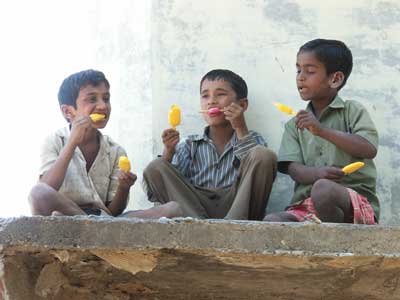The Village Life
Mar 23, 2005

We spent four days in Batha, a village that you can't get to by car and a village that had never seen any visitors. Like all our plans, this wasn't by our design. We just walked from Kabirwad and after a kilometer through the fields, we run into Batha.
We didn't know anyone, we didn't have any plans. Perhaps because of that, we experienced pure village life.
As we walk into Batha, in a single file line of 20 people, we greet people along the way and immediately keep an eye out for serving others -- like Rinku. Some villagers offer us a small hut, as a natural part of playing host. Then they see us picking up plastic and and cleaning the temple area, with all the brooms and hoes we carried with us, and another drunk villager gives us an "upgrade" to a larger hut (which is about the size of most kitchens in the US).Throughout the day, we pick up tons of plastic that's peppered throughout the village. And you'll be surprised how much you can learn from people's trash -- tobacco wrappers, plastic bags used for liquor, biscuit packaging. We interact with any and everyone, diagnose the ill patients with basic first-aid, attempt to rest in a fan-less room with 35 degree celsius heat, and play frisbee with the kids in the evening.
Ah, the good life.
By night time, it seems like half of the village knows us. Seeing five white faces amongst us is a real fancy for them; some of them have even heard of America and Canada but none of them have seen an airplane. We have a "bhajan" singing session, past 10PM, with about 50-60 villagers, outside the temple grounds.
With a shawl, some of us sleep on the cow-dung prepped ground while Gaurav gets a bullock cart as his bed. Mosquitoes are part of everyday life but Viral and Jayeshbhai's night included bed-bugs. While city folks buy alarm clocks that mimick rooster sounds, we wake up to loud "coook-de-cooook" hymns in our ears. And Guri was a happy camper because each morning is inaguarated by tea with fresh goat milk from a goat standing next to the front porch.
Accumulation of wealth is accumulation of sin, Gandhi used to say. And one can easily imagine why Gandhi loved villages. Everything is in the present. Everything is fresh, including the daily-picked vegetables that you eat for lunch. Although everyone has to work seven days a week to survive, no one is in a rush. Not everyone is overflowing with compassion, not all are deeply religious, but there's a strong sense of natural humanity to all of them. Walking through the acres and acres of farm land, it's easy to find peace. Because of intermitent electricity and minimal infrastructure, you see the moon and stars hovering over you instead of light bulbs burning at 3AM.
In this particular village, everything is quite literally impermanent. Every monsoon, all their homes get washed away and they have to go to the other shore. As a result, they live simply, don't get attached to their material things as much, and ensure maximum recyclablity. Using the fields as toilet is manure, burning waste generates heat that is used for cooking, ash is used as detergent, the coconut covers turn into dish scrubbers, the kitchen waste becomes compost, and so on.
This is not to say that Batha doesn't have problems. Many men are hopelessly drunk by night time. Even in a small village with 100 families, there is a section where the "poor" people that stay. Many homes have TV and some even get color TV, which introduces them to all kinds of soap-operas. Women aren't empowered. The youth isn't inspired to take any leadership; many of them feel "stuck" because they weren't educated or failed and dropped out. Surely, that's all there. But for all its intelligent models and cutting edge technologies, the cities problems seem far worse than the villages.
On our third day there, Jayeshbhai gave us an interesting assignment: go find your own food. That meant, connecting with a family, providing some value, and sharing a meal with them. Everyone did different things, some cheated :), some didn't eat. Maria and I went to farming, with two kids that I met the previous night's "garba" dance; they were really good people, so I thought we'd connect.
Within one bullock cart ride, we became fast friends. Not only did we eat lunch with them, but as we left 20-year-old Munnabhai says, "Nipunbhai, I'm getting married next year. Will you be able to make it? I would love to have you there."
Just one afternoon with someone, and they love you like a brother.
We can learn a lot from our villages.

